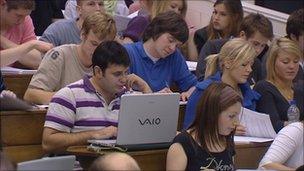Teacher training comes under fire
- Published

Teacher training recruits are said to lack basic skills
Teacher training institutions are being accused of letting incompetent staff into the profession.
A wide range of organisations are submitting their views to the Donaldson review, which was set up by the Scottish government to investigate how teachers are trained.
大象传媒 Scotland has obtained a submission made to the report by the Scottish Council of Independent Schools (SCIS), the body which represents private schools.
It claims the training colleges recruit some students who have a poor grasp of basic skills, such as spelling and numeracy.
The submission also suggests trainees who may lack personality and a commitment to engaging pupils' interest are allowed on to courses.
The report also states: "A minority of probationers struggle and it is doubtful whether they will be able to be successful teachers even with support and encouragement.
"Both universities and schools are reluctant to 'fail' a probationer, yet the General Teaching Council of Scotland (GTCS) system demonstrates that some should not have been passed at the outset."
The SCIS suggests lecturers at training colleges can be "far removed from the 21st century and out of touch with the current generation of pupils".
Selection panels
The claims from private schools are similar to those from HM Inspectorate of Education, which said in its submission to the Donaldson review that many new teachers in Scotland felt ill-prepared to teach basic literacy and numeracy.
According to HMIe the need for improvement is great, as research has indicated that Scottish education is less successful than other countries in closing the gap between the achievements of children from well-off and less well-off homes.
Private schools recruit, for the most part, from the same teacher training "colleges" as state schools.
The colleges have been absorbed by Scottish universities and are now called teacher education institutions.
According to the SCIS report, there is a lack of confidence that newly-trained staff will know their subjects well and be competent in practical classroom skills.
Lectures on some courses are described in the report as "meaningless".
But SCIS praises changes in training in recent years, such as a guaranteed year's work for probationers to allow them to hone their skills.
The private schools' body calls for the recruitment of student teachers to become a more rigorous process, with front-line teaching staff sitting on selection panels.
According to the SCIS, training standards may be one reason teachers do not seem to command the same respect as professionals in other fields.
Tony Axon, of the lecturers' union UCU, said training had improved in recent years.
He added: "People may complain about spelling and grammar but these days we sit at a computer which works out much of that for you. Are those skills really as important as they used to be?"
A spokesman for Scotland biggest teaching union, the EIS, said: "Scottish teachers are some of the best qualified in the world, and are held to a particularly high set of professional standards.
"All teachers in Scottish state schools hold at least a degree level teaching qualification, must meet stringent GTCS standards and are committed to Continuous Professional Development throughout their careers."
He added: "While it is right that we should examine what is taught in initial teacher education in order to ensure that teaching standards remain high, Scottish Teacher Education Institutions have consistently sent well-educated, highly trained and extremely dedicated teachers into our education system.
"Any individuals who are unsuited to a career in teaching tend to be filtered out quickly during ITE and will not make it to graduation or through the world-leading teaching induction programme that operates in our state schools."
The Donaldson Review, an inquiry commissioned by the Scotttish government into teacher training, is being led by Graham Donaldson, former head of HM Inspectorate of Education.
It is due to be published at the turn of the year.
- Published3 August 2010